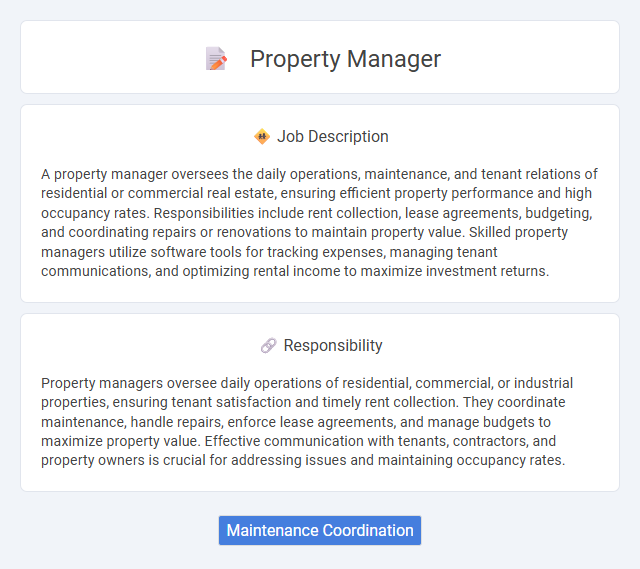
A property manager oversees the daily operations, maintenance, and tenant relations of residential or commercial real estate, ensuring efficient property performance and high occupancy rates. Responsibilities include rent collection, lease agreements, budgeting, and coordinating repairs or renovations to maintain property value. Skilled property managers utilize software tools for tracking expenses, managing tenant communications, and optimizing rental income to maximize investment returns.
Individuals with strong organizational skills and a calm demeanor are likely suitable for a property manager role, as the job demands handling tenant issues, coordinating maintenance, and managing finances efficiently. People who thrive in stressful situations and possess excellent communication skills probably adapt well to the frequent problem-solving and negotiation tasks involved. Those lacking patience or multitasking ability may find the role challenging and less suitable for their temperament.
Qualification
Property managers typically require a combination of formal education and practical experience, with a bachelor's degree in business administration, real estate, or related fields preferred. Key qualifications include strong organizational skills, proficiency in property management software, knowledge of landlord-tenant laws, and excellent communication abilities to handle tenant relations effectively. Certification such as the Certified Property Manager (CPM) or Real Property Administrator (RPA) can enhance job prospects and demonstrate professional competence.
Responsibility
Property managers oversee daily operations of residential, commercial, or industrial properties, ensuring tenant satisfaction and timely rent collection. They coordinate maintenance, handle repairs, enforce lease agreements, and manage budgets to maximize property value. Effective communication with tenants, contractors, and property owners is crucial for addressing issues and maintaining occupancy rates.
Benefit
A property manager likely enhances property value by ensuring regular maintenance and tenant satisfaction. They probably reduce financial risks through efficient rent collection and handling legal compliance. Employing a property manager can increase overall returns while minimizing time and stress for property owners.
Challenge
Property manager jobs likely present challenges related to balancing tenant satisfaction with maintenance demands and budget constraints. Navigating unpredictable repair issues and enforcing lease agreements may frequently require strong problem-solving skills. Effective communication and time management are probably essential to handle high-stress situations and ensure smooth property operations.
Career Advancement
A property manager oversees the daily operations of residential and commercial real estate, including tenant relations, rent collection, and maintenance coordination. Career advancement opportunities often lead to senior roles such as regional property manager, asset manager, or director of property management. Gaining certifications like Certified Property Manager (CPM) or Real Property Administrator (RPA) enhances credibility and opens doors to higher-level management positions.
Key Terms
Maintenance Coordination
Property managers specializing in maintenance coordination oversee routine inspections, repairs, and preventive maintenance to ensure building systems operate efficiently and tenants experience minimal disruptions. They liaise with contractors, schedule service appointments, and monitor maintenance budgets to optimize operational costs while maintaining property standards. Effective communication and prompt problem-solving skills are critical for managing maintenance requests and prioritizing urgent repairs in residential or commercial properties.
 kuljobs.com
kuljobs.com